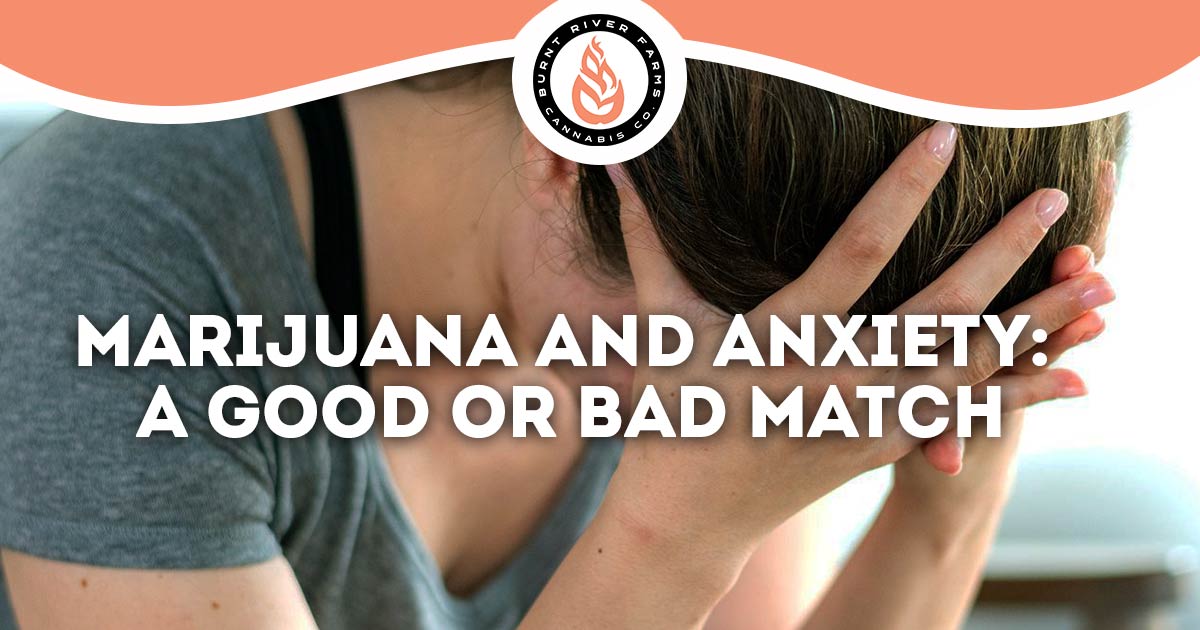Marijuana and Anxiety: A Good or Bad Match

With anxiety being one of the most common mental health disorders, more people are seeking non-traditional anxiety treatment options in order to find relief. Now, on the heels of a pandemic, this is truer than ever. The legalization of marijuana has opened a door to a new world of treatments for anxiety disorders. But many are asking if the cannabis plant is truly a valid way to get anxiety relief. Together, we’ll take a deeper look at the true power of cannabis and the effects of marijuana as an anti-anxiety medication.
Marijuana as Self-Medication – It may Depend on the Individual
Across the country, many people are already using medical marijuana or recreational marijuana. Medicinal cannabis is used to treat chronic pain, inflammation, increase appetite, help control seizures, and more. It comes in many forms, from CBD oil and other CBD products, to edibles, to vapes, and smokables. This wide selection of cannabis products allows users to enjoy the benefits of the therapeutic cannabinoids found within the cannabis plant in several ways. Existing cannabis users are already well aware of the effects of THC, but we are here to help educate those individuals who are not familiar with the benefits and effects of marijuana.
Before you ditch your prescription medications and run out to your local dispensary to purchase marijuana for your anxiety symptoms, read on. While research is lacking in the determination of using marijuana for anxiety treatment there are some scientific reports suggesting that marijuana may temporarily assist with generalized anxiety disorder, social anxiety disorder, panic disorder and panic attacks, depression, sleep problems, fibromyalgia, agoraphobia, and stress management. This is, in part, thanks to the calming experience that helps many patients find relief from their anxiety symptoms.
Everything in Proper Moderations
Anytime that someone decides to take it upon themselves to use a substance to either treat or cope with a medical problem, mental illnesses, etc., it’s called self-medication. This generally provides immediate relief of uncomfortable symptoms, which, in turn, encourages use. However, not much is yet known about the long-term consequences of the treatments of anxiety using cannabis for anxiety.
When it comes down to it, there’s more to anxiety disorders than simply making the symptoms fade away. It’s important to work with a professional to help resolve your anxiety in order to live a long, healthy life. This is why it’s so important to understand that marijuana won’t fix your anxiety. It simply helps with the symptoms. Therapy can also be a very useful tool for combating anxiety and other mental illnesses.
It’s also important to use cannabis in the right mindset to relieve anxiety. This has become easier in most places as marijuana becomes legal in more and more states. However, if you’re using marijuana and feel as though you’re doing something wrong then your mind can very possibly get stuck on the idea and amplify it. This can sometimes result in more anxiety and even feelings of paranoia. People who use cannabis with a mindset that they aren’t doing anything wrong, and they aren’t afraid of getting caught or getting in trouble tend to have fewer cannabis-related anxiety issues. Many individuals say that THC amplifies whatever you’re experiencing at the moment. Keep this in mind before you partake.
Making the Choice that Fits Your Needs
If you’re naturally anxious, it’s best to use cannabis in a place where you feel safe and don’t have to worry about whatever causes you anxiety. Then, once you know what to expect from the high associated with the THC in cannabis, you’ll have a better understanding of how it works and how your body responds to it.
It’s also important that you speak with your health care provider before self-medicating with cannabis. This will help ensure that there won’t be any issues or negative interactions between your current medications and marijuana. You should also be aware of all of the possible risk factors and benefits alike before deciding to use marijuana to self-medicate.
Potential Benefits and Risks
Benefits
Using marijuana short-term may reduce depression, relieve anxiety temporarily, and reduce stress. You may experience different results depending on the marijuana strain. An experienced dispensary will help you understand which strains might be best for you and the symptoms you want to relieve.
Washington State University published a study that found smoking cannabis significantly reduces self-reported levels of anxiety, depression, and stress. However, the study also showed that repeated use doesn’t provide long-term symptom relief and actually increases depression in some individuals over time.
Risks
There are some risks associated with using marijuana as a potential treatment for pre-existing anxiety or feelings of anxiety. Some past users have shown higher levels of psychiatric disorders or worsening symptoms. It can also lead to psychological dependence. Marijuana may also result in long-term memory loss. Increased tolerance and need may require you to use more cannabis down the road than you originally needed at the start of your self-medication journey. It’s also possible to develop cannabis hyperemesis syndrome. CHS is rare but causes cyclical nausea and vomiting. The only way to get rid of CHS is with abstinence from marijuana.
There are also adverse effects to using tetrahydrocannabinol (THC). This is the compound that provides psychoactive effects to marijuana. In fact, some people develop several side effects after frequent or long-term use. THC raises heart rate, which may make some patients feel more anxious. It can also lead to orthostatic hypotension, which is a sudden blood pressure drop when standing. This leads to lightheadedness, dizziness, nausea, confusion, blurred vision, and possibly even fainting. Other research indicates that marijuana use in adolescence can be a predictor of anxiety and depression later on.
The clear solution to the risks associated with THC are to choose a cannabis product with either very low levels of THC or a product with zero THC. Various CBD oils and products exist that have exceedingly small amounts of THC.
Do Your Homework Before Using Marijuana for Anxiety
If you’re interested in using marijuana or cannabidiol (CBD) to get relief with your anxiety disorders or depression, make sure you’re first speaking with a medical professional. Current cannabis users should also speak with their doctor before changing, starting, or stopping any medications. While more clinical trials are needed for treatments of anxiety disorders, there are some benefits to using cannabis to help relieve symptoms. However, cannabis should not be your only tool. Eating a balanced diet, getting plenty of exercise, and therapy can also help improve your mental health.
We are constantly learning more about the endocannabinoid system which helps keep the body and mind in balance. Until we know more, it’s difficult to nail down a universal dosage for these mental health disorders. Stay tuned for more updates as research continues to provide us a better look at the benefits of cannabis use for treating your anxiety.
